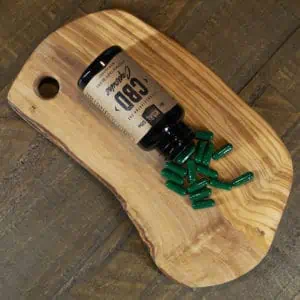CBD and antibiotics…a match made in heaven or a recipe for disaster? As CBD continues to make waves in the medical world with its plethora of health benefits, antibiotics have long been hailed as medical marvels. But what happens when these two powerhouses collide? Can they work together harmoniously or do they clash like oil and water?
CBD has gained popularity for its potential therapeutic effects, addressing a range of conditions such as sleep issues, mood disorders, muscle recovery, pain management, and inflammation control. It has become a staple in many people’s daily routines. So, if you find yourself in need of antibiotics, it’s natural to wonder if you can still incorporate CBD into your regimen.
To make an informed decision about combining CBD and antibiotics, it’s important to understand the potential advantages and disadvantages. However, keep in mind that this article is meant to educate and should not replace professional medical advice. Always consult your doctor before using CBD alongside antibiotics. By delving into the possible interactions and effects of CBD and antibiotics, you’ll have a better understanding of how to navigate your treatment journey. So, let’s explore the fascinating world where CBD oil and antibiotics intersect, and remember, knowledge is power when it comes to your health.
CBD and Antibiotic: Chemistry Overview

CBD is often considered a safe and well-tolerated product, but it’s essential to exercise caution when combining it with certain pharmaceutical medications. This is because of the fascinating interaction between CBD and the cytochrome P-450 enzyme system, located in the liver.
Picture the P-450 system as a bustling team of more than 50 enzymes, working diligently to break down toxins in your body. Many commonly used medications rely on this system for processing, including some antibiotics like penicillins. Surprisingly, these antibiotics not only utilize the P-450 system but also inhibit it. The only antibiotics processed by the P-450 system are clarithromycin (Biaxin) and erythromycin.
So, here’s where it gets interesting if you’re taking clarithromycin or erythromycin alongside CBD, it may lead to what we like to call the “grapefruit effect.” Just like grapefruit, CBD inhibits the P-450 system. This inhibition can slow down the processing of the antibiotics in your body, resulting in higher levels of the medication’s active ingredient. And as we all know, higher levels could increase the likelihood of experiencing side effects.
Let’s be clear: combining CBD and antibiotics isn’t inherently unsafe. However, it’s crucial to understand how this combination might impact you personally. That’s why we highly recommend having a chat with your doctor before embarking on a journey with CBD oil and antibiotics. You can also consider consulting a naturopathic doctor who specializes in utilizing cannabidiol for specific medical conditions. Remember, knowledge is power, especially when it comes to your well-being.
Taking Antibiotic Medication: Precautions
When it comes to antibiotics, it’s important to take them seriously and follow the prescribed regimen for maximum effectiveness. Here are some essential precautions to keep in mind:
- Complete the Mission: Don’t bail out early! Finish the entire course of antibiotics, even if you start feeling like a superhero. It’s crucial to eliminate all the pesky bacteria and prevent potential comebacks.
- Hold the Drinks: While it might be tempting to raise a glass, it’s best to steer clear of alcohol during antibiotic treatment. Alcohol can interfere with the medication’s effectiveness and increase the risk of side effects. So, save the celebrations for after your superhero recovery.
- Mind the Supplements: While fiber is generally fantastic for your digestive system, it’s better to put it on hold during antibiotic treatment. Fiber supplements can affect the absorption of antibiotics, so take a break and let the antibiotics do their job without interference.
- Watch Your Mixers: While orange juice and milk might make a tasty combination for breakfast, they don’t mix well with antibiotics. These beverages can hinder the absorption of certain antibiotics, so stick to water when taking your medication.
- Timing is Everything: Set a regular schedule for taking your antibiotics. Try to take them at the same time every day, or as close to it as possible. This helps maintain a consistent level of medication in your system, maximizing its effectiveness.
- Sun Sensibility: Some antibiotics can make your skin more sensitive to sunlight, increasing the risk of sunburn. Protect yourself by wearing sunscreen, covering up, or simply avoiding prolonged exposure to the sun while on your antibiotic adventure.
Remember, it’s always wise to consult your doctor if you have any concerns about how your diet or lifestyle may interact with your antibiotics. They’re the experts who can provide personalized guidance for your specific situation.
CBD Dosage: Tips & Tricks
To get the party started, begin with the lowest recommended dose indicated on your CBD product. It’s like dipping your toes in the dance floor before busting out your best moves. From there, you can groove your way up or down as needed, adjusting the dose to find your sweet spot.
The beauty of CBD is that it’s like the cool, calm guest at the party—no significant side effects, no buzz-killing intoxication, and absolutely zero risk of overdose or addiction. So, go ahead and unleash your inner scientist as you experiment with different dosages and concentrations until you discover your CBD rhythm.
Need a little guidance to find your dosage groove? Don’t worry, we’ve got your back. Check out our dosage guide for expert tips and tricks to help you navigate the dance floor of CBD dosing. Let’s find that perfect dose that gets you in the groove and keeps you moving and grooving like a CBD superstar.
THC / Weed and Antibiotics
Cannabis, the intriguing plant with its wide range of effects, has been sought after by many for its medicinal potential. From soothing chronic pain to calming digestive issues and anxiety, medical cannabis has gained popularity in recent years.
While cannabis has become legal in several states, its impact on certain health conditions remains a mystery. So, does weed affect antibiotics – or does THC affect antibiotics? Research in this area is still limited on weed with antibiotics, leaving us with mixed findings. Here are a few results that make pique your interest in cannabis and antibiotics:
- Some studies suggest that certain cannabis strains possess antibacterial properties that could complement antibiotics in tackling stubborn infections. It’s like having a dynamic duo fighting off those pesky bacteria.
- On the flip side, there are indications that cannabis might slow down the body’s processing of antibiotics, potentially hindering their effectiveness and prolonging the infection. It’s like throwing a speed bump in the path of your antibiotics’ race against time.
- Mixing cannabis and antibiotics could also increase the risk of side effects from both parties. It’s like throwing a wild party where things might get a bit out of control.
- Then again, there’s a possibility that combining THC and antibiotics might not have a significant impact at all. Most of the evidence we have is based on personal experiences, lacking concrete scientific backing.
Considering the limited research available, it’s prudent to exercise caution when using THC and antibiotics together. While the idea of synergistic benefits sounds intriguing, it’s important to consult with your healthcare provider and approach the combination with care.
Does CBD Affect Antibiotics?

CBD and antibiotics may seem like a dynamic duo in the fight against infections, but their approaches are as different as peanut butter and jelly (minus the bread).
When it comes to antibiotics – their mission is clear: target and destroy bacterial cells by honing in on the elements unique to those pesky invaders. It’s like a full-scale battle where no bacterial cell is spared, including the good bacteria that keep your gut happy. And just to be extra selective, antibiotics also ignore any bacteria that have developed resistance.
On the other hand, CBD takes a more mysterious path. While researchers are still unraveling the secrets of how it fights bacteria, one thing is clear: CBD has antimicrobial properties that make it a valuable contender in the infection-fighting arena. It has shown particular promise in tackling bacteria that have developed resistance to traditional antibiotics. Take that, stubborn superbugs!
In a study that deserves a standing ovation, various cannabinoids, including CBD and THC, were put to the test against six strains of the antibiotic-resistant MRSA superbug. The result? All the cannabinoids flexed their antimicrobial muscles, showing “potent activity” against the bacteria. The researchers were especially impressed by CBD’s performance, as it tackled even the most treatment-resistant strains like a champion fighter.
Combining CBD with antibiotics can potentially create a dynamic duo that fights infection with a double whammy. But hold your horses! Before you embark on this tag-team approach, it’s crucial to consult your doctor to ensure the dosages are on point. Alternatively, you might decide to take a solo route by using a high-concentration CBD product to battle the infection initially. This approach preserves the good bacteria in your body while helping to combat the growing army of treatment-resistant bacteria that stem from the misuse of antibiotics. It’s a win-win for you and the world!
Antibiotics & CBD: Curbing Side Effects
Ah, antibiotics, the heroes of modern medicine! They’ve rescued countless lives, but like all heroes, they have their quirks too.
While we’re still uncovering the full extent of CBD’s antimicrobial powers, it turns out its true superpower might lie in mitigating the side effects of those trusty antibiotics.
| Name | Side Effects | CBD Action |
|---|---|---|
| Amoxicillin | Nausea; vomiting; stomach pain | Combats nausea and vomiting and reduces the experience of pain |
| Azithromycin | Nausea; vomiting; stomach pain | Combats nausea and vomiting and reduces the experience of pain |
| Clindamycin | Nausea; vomiting; joint pain | Combats nausea and vomiting and reduces the experience of joint pain associated with conditions like rheumatoid arthritis |
| Cephalexin | Nausea; vomiting; stomach pain | Combats nausea and vomiting and reduces the experience of pain |
You see, CBD has a knack for counteracting the most common side effects of antibiotics. It’s like the sidekick that swoops in to save the day, ensuring that when you combine CBD with antibiotics, you might just skip those pesky side effects altogether. Now, we must admit, this evidence is purely anecdotal, but hey, it’s worth a shot, right?
Can You Take CBD While On Amoxicillin?
When it comes to the intriguing world of cannabinoids found in medical cannabis, such as THC and CBD, they possess some impressive immunomodulatory powers that can affect how our bodies handle inflammation. While there are no known direct interactions between CBD and Amoxicillin, it’s worth considering that there could be potential effects on the efficacy of antibiotic medications.
Now, before you jump to any conclusions, let’s remember that no adverse effects have been definitively linked so far. However, that alone isn’t enough to give a resounding “yes” to this combination. We must defer to the ultimate authority in matters of medical advice: the esteemed medical doctor.
Find the Best CBD for Antibiotics
When it comes to the exciting adventure of combining CBD with antibiotics, it’s essential to have a heart-to-heart with a medical professional. Once you’ve received the green light from your trusted doc, it’s time to embark on your CBD journey.
But hold your horses, savvy shopper! Don’t just grab any old CBD product off the shelf. Aim for the best by seeking out high-quality CBD oil brands that undergo third-party lab testing and proudly present their Certificates of Analysis. These certificates are like a backstage pass, giving you a VIP look at what’s inside your CBD product—potency and safety details included. And if you want to take it up a notch, go for a nautral CBD product to ensure it’s free from any pesky pesticides or herbicides. Pure bliss in every drop!
If you’re battling a chest infection, puffing away on a vape pen might not be your cup of tea (or cough syrup). Fear not, for CBD comes in various forms. Consider opting for convenient CBD capsules instead. They’re like tiny warriors, ready to combat your ailments with ease. But hey, it’s your CBD adventure, so explore what your chosen CBD brand has to offer. Reach out to them for the inside scoop on how long it takes for the effects to kick in and how long they’ll last. They’ll guide you through this cannabinoid quest like the experts they are.
Remember, my adventurous friend, consulting a medical professional is key, and selecting the perfect CBD product is an art. So buckle up, embrace the CBD journey, and get ready to conquer those antibiotics like the fearless warrior you are!
Understanding Antibiotic Resistance & CBD

Antibiotic resistance is like a game of hide-and-seek where those sneaky microbes, bacteria, and fungi develop their superpowers to dodge the drugs meant to defeat them. These resistant baddies party in our bodies, causing infections and laughing at our ineffective antibiotics. It’s a real headache for medical professionals and patients alike because it means some antibiotics no longer pack their punch against certain infections. Talk about a plot twist in the fight against diseases!
So, what’s the plan, you ask? Well, scientists are working their lab-coated magic to tackle antibiotic resistance from different angles. They’re constantly analyzing bacteria to keep tabs on their resistance levels. The latest resistant troublemaker on the block is the Ceftazidime-avibactam-resistant KPC-producing Klebsiella pneumoniae. Quite the mouthful, huh? This bacterial rebel was identified back in 2015, and it’s been causing some serious headaches ever since.
But wait, there’s hope on the horizon! CBD, the versatile superstar of the hemp world, has caught the attention of several labs for its potential in taking down antibiotic-resistant bacteria. With the last global situation, like the Covid-19 pandemic, researchers are even more eager to dive into this promising area.
Let’s zoom in on a recent study conducted by a team of brilliant minds led by Mark Blaskovich, the director of the IMB Centre for Superbug Solutions at the University of Queensland in Australia. These scientists decided to put CBD to the test, and boy, did it deliver! They confirmed previous findings and expanded their scope to include notorious troublemakers like Staphylococcus aureus, Streptococcus pneumoniae, and Clostridioides difficile. Cannabidiol didn’t discriminate—it went after both the tricky Gram-positive and sneaky Gram-negative bacteria. Talk about taking no prisoners!
Antibiotic resistance is a big, bad hurdle in our quest to prevent and treat various diseases while minimizing recovery times. Understanding this phenomenon inside out and finding ways to conquer it would be a major breakthrough in global medicine. It’s time to level up our game and show those resistant microbes who’s boss!
Could CBD Replace Antibiotics?
Back in the 1950s, early reports hinted at the potential antibacterial powers of cannabinoids. However, since the chemistry of the cannabis plant wasn’t fully understood at the time, scientists couldn’t pinpoint the specific component responsible for its bacteria-fighting abilities. Then, in a groundbreaking discovery in 1976, it was revealed that both ∆9-THC and CBD have the potential to be both bacteriostatic and bactericidal against certain types of Gram-positive pathogens.
Fast forward to 2020, a group of researchers from the University of Melbourne and Monash University embarked on a mission to explore the antimicrobial activity of cannabinoids. Their findings revealed an exciting possibility: cannabinoids could serve as a fresh source of antibiotics, especially as bacteria continue to develop resistance against existing drugs.
The study particularly highlighted the antimicrobial potential of CBD. The researchers were astounded to uncover that CBD may possess even more remarkable antimicrobial properties than previously reported, potentially finding clinical use in nasal decolonization.
Another international study, involving researchers from the University of Eastern Piedmont, the University of London, and the Industrial Crops Research Center, added to the growing body of evidence. Their research indicated that CBD could potentially combat pathogenic bacteria.
While these studies provide compelling evidence of the antimicrobial activity of cannabinoids and showcase promising results in lab tests, it’s crucial to note that there is currently no data from human or animal studies. As such, the question of whether CBD oil could replace antibiotics will likely remain unanswered for the next few years, awaiting further research.
CBD & Antibiotics: Final Thoughts

When it comes to the combination of CBD and antibiotics, it’s a bit of a gray area due to the limited research available. We highly recommend consulting with a medical professional before embarking on this unique journey. They can provide valuable advice on dosage, product types, delivery methods, and any other important information regarding CBD products.
While CBD is generally well-tolerated in moderate doses, it’s crucial to pay attention to how your body reacts. If you experience any undesirable side effects, it’s wise to discontinue use or adjust your dosage accordingly. We want your CBD experience to be nothing short of amazing.
It’s important to note that CBD should not be used as a replacement for prescribed antibiotics. The scientific community is still working on unraveling the mysteries of CBD’s antimicrobial activity, and we eagerly await further research and lab testing to shed more light on the subject. We need solid evidence to determine whether combining CBD, CBG, or THC with antibiotics is safe and effective for both animals and humans








